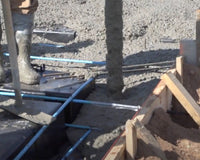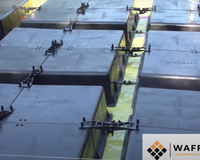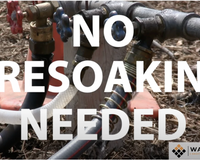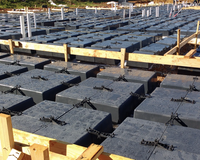Geotechnical surveys, also known as soil reports or soil investigations, should be the first step in any construction project. Your local building code will likely require you to have a current soil report when applying for permits. The report will also contain valuable information for structural engineers, architects, and contractors.
Before you start building, you need to know when to get a geotechnical survey for your construction site.

When is a soil report required?
Soil investigations are almost always required before any residential construction project can begin. They are best used in the early phases of site development to help determine your project’s best placement, design, and size.
When you need a soil report:
- Designing residential projects
- Applying for permits
- Major home renovations
- Buying an older home
- During any new construction
Some localities may not require soil reports when there is no recorded history of excavation, construction, or industrial activities, and when there is promising information from soil reports conducted in nearby areas. If you have a recent and valid soil report for your site, you can also use this in place of your soil report requirement.
But even when soil reports are not required, they are still valuable to the design process and for getting up-to-date information on your soil conditions. The benefits of working with a geotechnical engineer far outweigh the cost of a soil report in the long run.

The objective of a geotechnical investigation
The main objective of a soil report is to inform you about the condition of your soil and anything you need to consider when building. This information can be of great help at almost every stage of the construction process.
Save time during construction. Unexpected delays, equipment requirements, and bad soil conditions can cause delays in your project. Understanding your soil will help you overcome these challenges without wasting any time.
Reduce costs all around. Using the best techniques and design processes for your soil will help you reduce construction costs. Preparing your home for your site’s soil conditions will also reduce the cost of future repairs.
Learn about your soil. Understand the contents of your soil, its weight-bearing capacity, behavior with water, and other critical factors you should consider when designing and building a home.
Make your construction site safer. Bad soil conditions and construction can be a recipe for disaster when you aren’t prepared for your site’s soil. Using your soil report, you can practice a higher level of safety on the construction site.
Get expert recommendations. Do you have bad soil? No problem. Your geotechnical engineer will offer expert advice to improve your soil, design your foundation, and ensure your home maintains its structural integrity.
Soil report cost and what to expect
Before consulting a geotechnical engineer, predicting your soil report cost can be challenging. It can range from $2,000 to $5,000 depending on the scope of your project and what is known about local soil conditions around your property.
The scope of your survey is up to the discretion of your geotechnical engineer. Only a quick above-surface inspection is required in some areas, while others may require a range of subsurface tests. These factors will affect the time it takes to complete the report, its cost, and subsequent building recommendations. A soil report can take anywhere from two weeks to two months, depending on your soil conditions.
You can expect your soil report to include information on past construction, industrial activity, and environmental factors affecting soil quality. Soil reports can also test for contaminants, and if contaminants are found, your geotechnical engineer can advise you on removing them.
Any problems indicated in your soil report will come with recommendations for improving your soil and making it safe for construction. This is why it is always best to consult a geotechnical engineer before starting your project.
Get a geotechnical investigation
Your geotechnical report is an essential first step in the construction process. You can use it to save big on costs, avoid delays, and ensure your foundation has the structural support it needs. For the best results, use geotechnical soil testing early in the design process to build with your soil in mind.
Are you looking for the right geotechnical engineer to conduct a report on your site? We’ve worked with dozens of engineers that can help steer you in the right direction. Contact us today for a list of recommended engineers!





